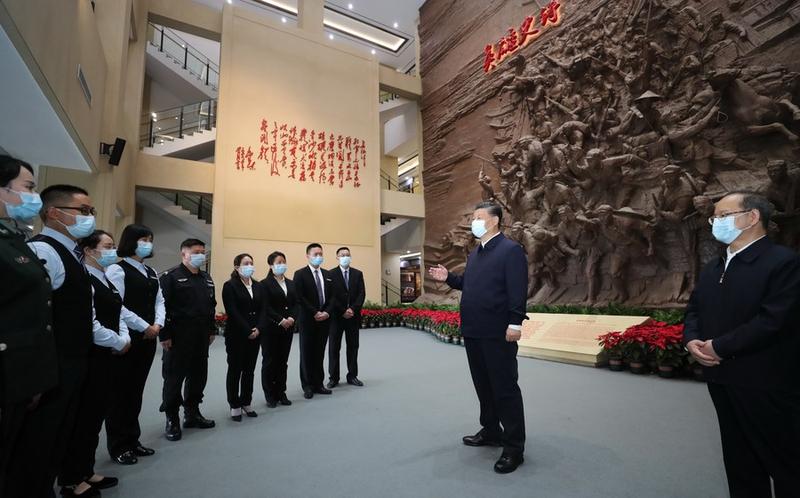


In his recent remarks during an inspection trip, Chinese President Xi Jinping reiterated strengthening belief via the learning of the history of the Communist Party of China (CPC).

Chinese President Xi Jinping, also general secretary of the Communist Party of China Central Committee and chairman of the Central Military Commission, visits a memorial hall in a memorial park dedicated to the Battle of the Xiangjiang River during the Long March in the 1930s, in Caiwan, a town in Quanzhou County in the city of Guilin, south China's Guangxi Zhuang Autonomous Region, April 25, 2021. (Xinhua/Ju Peng)
As the CPC marks its centenary in 2021, the Party looks back at its history and recounts the shining moments in it.
Xi, also general secretary of the CPC Central Committee and chairman of the Central Military Commission, has on multiple occasions shared stories about the CPC and the spirit manifested within.
TRANSLATOR WHO TOOK INK FOR SUGAR
When speaking of the first Chinese version of the Communist Manifesto, Xi often shares the quote "the taste of truth is so sweet," which originates from the deeds of translator Chen Wangdao.
In 1920, young Chen Wangdao started translating the manifesto in his home village in east China's Zhejiang Province. One day, Chen's mother made him sticky rice dumplings and suggested he dip them in brown sugar water.
"I did, and they were very sweet," he responded. However, he was so absorbed in his work, and did not realize his mouth was stained black as he had dipped the dumplings in ink instead. It was with such dedication that Chen finished the translation and introduced the principles of Marxism into China.
Chen's work paved the way for the birth of the CPC. Over the years, the CPC has inherited the ideas and combined the fundamental principles of Marxism with China's reality during the country's revolution, construction and reform.
To this day, Chinese leaders have attached great importance to studying the Communist Manifesto. In the new era, the principles and spirit of Marxism continue to lead the way for the CPC.
SOLDIERS WHO CUT UP THEIR QUILT
Members of the CPC always bear in mind the interests and needs of the people. In September 2020, when visiting the city of Chenzhou, central China's Hunan Province, Xi cited a revolutionary story that took place there in 1934.
In the middle of the arduous Long March, Xu Jiexiu, an impoverished mother living in the local village of Shazhou, received three female Red Army soldiers at her home.
Shocked that Xu had only hay for mattresses and some torn-up cotton wool for quilts, the soldiers shared their only quilt with her and her son during their stay. As they were leaving, they insisted that she keep it for the winter, which Xu refused.
To settle the dispute, a soldier cut the quilt and left Xu half of it. Deeply touched, Xu never forgot about the soldiers or their acts of kindness for the rest of her life.
Lacking food and clothing, even facing life-or-death situations, the Red Army still kept the people's well-being in mind, Xi said, noting that the story shows the CPC's original aspiration and character.
Today, nearly a century from when Xu sheltered the three soldiers, the spirit manifested in the story of "half a quilt" still shines on.
As China embarks on a Long March of the new era, Xi has reassured the public of the CPC's people-oriented attribute, stressing that the Party remains committed to serving the people, which is not only a slogan, but also an action of persistence.
Achieving a complete victory in China's fight against poverty, which saw the final 98.99 million impoverished rural residents lifted out of poverty over the past eight years, the Party is moving on toward its goal of building a modern socialist China and common prosperity for all.
"BEGGAR" WITH GOLD BARS ON HIS BACK
It is the CPC's uncompromising requirement for its members to remain incorruptible. When inspecting east China's Jiangxi Province in 2019, Xi spoke of the deeds of Liu Qiyao, a faithful and uncorrupted Party member.
As the leader of the Communist authority in Jiangxi, Liu was once trusted with the activity funds of the local Party organization, including 13 gold bars.
In the 1930s, after losing connection with his comrades in a battle, Liu packed up the hidden funds, embarked on a journey to find them during which he once even lived a beggar's life.
After finally getting in touch with other Party members, Liu submitted the funds. To everyone's surprise, none of the valuables were missing. Even in his most desperate days, Liu did not use any of the funds for himself.
"Only if we remain clean and upright in governance can we win public trust," Xi noted.
Despite historic achievements made over the past years on fighting corruption, it remains the biggest risk to the Party's governance, as Xi has pointed out.
The self-improvement of the CPC, a ruling political party with more than 91 million members, has a major bearing on the future of a country of over 1.4 billion people.
Just as Xi once put it, "The governance over the Party must always be strict, so that the CPC can lead and ensure the smooth sailing of the great ship of socialism with Chinese characteristics."
